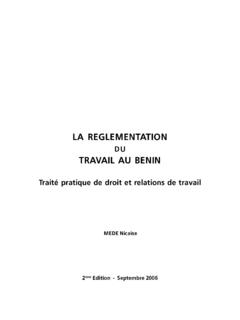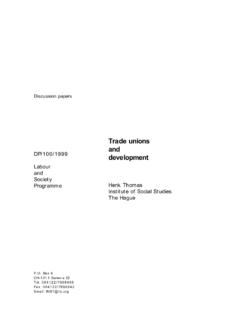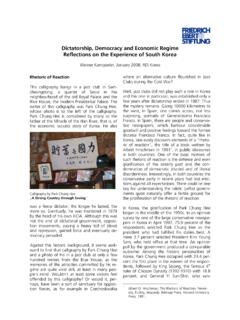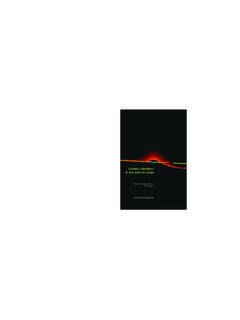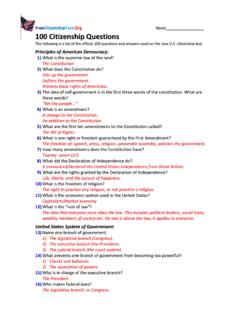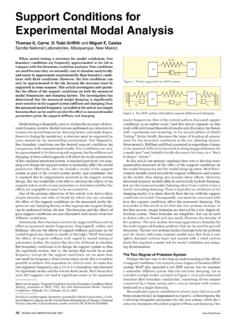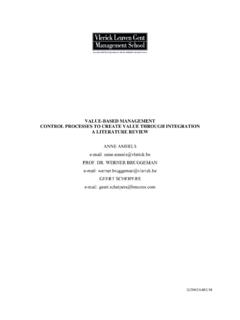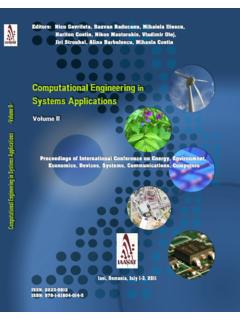Transcription of REFORM OF PUBLIC SECTOR MANAGEMENT
1 REFORM OF PUBLICSECTOR MANAGEMENTA relevant question for Unionsin the PUBLIC SECTOR ? 1by Brendan MartinDWP (E) 1 Background paper for EPSU/ETUI Conference, Brussels, October 23-24, 1025-2533D/1997/3163/20 REFORM of PUBLIC SECTOR MANAGEMENT - A relevant question for Unions in the PUBLIC SECTOR ?DWP (E)3 ContentsForeword .. 51. Introduction .. 72. Old Wine in New Bottles? .. 73. The Politics of Terminology .. 84. New Wine in Old Bottles? .. 95. Pressures for change .. 126. Forms of change .. 167. Tension between objectives .. 178. Impact on pay systems .. 189. Performance-related pay .. 2010. Separation of policy making and implementation .. 2211. Performance MANAGEMENT and appraisal .. 2412. PUBLIC MANAGEMENT REFORM and equal opportunities.
2 2713. PUBLIC MANAGEMENT and ethics .. 2914. PUBLIC MANAGEMENT REFORM and training .. 3415. Good practice? .. 3616. A new union approach .. 41 Brendan Martin 4 DWP (E) REFORM of PUBLIC SECTOR MANAGEMENT - A relevant question for Unions in the PUBLIC SECTOR ?DWP (E)5 ForewordPublic services have always represented an important factor for social cohesion and a significantcontribution to the economic infrastructures essential for the operation of social market PUBLIC debate allusion is frequently heard to the inefficient, ineffective and over-expensive natureof PUBLIC services. Generally speaking, however, such comments are evidence of radical free marketleanings seeking to justify the dismantling or even the destruction of PUBLIC services.
3 That in a contextof overwhelming structural change there is a need for adjustment and modernisation of publicservices is, from a trade union angle, undisputed. Thus, among other things, the ETUC at its 8thstatutory congress held in May 1995 concluded that in order to fulfil their tasks and modernise soas to be able to meet the needs of the people who use and benefit from them, the PUBLIC servicesneed to adapt to the new situation in Europe. (..) The PUBLIC SECTOR is confronted by the variousstructural changes in society, which will influence the role it should play and the measures it shoulddevelop . But the trade unions continue to regard the PUBLIC services as a cornerstone of theEuropean social model.
4 And this was acknowledged in spite of all contradictions in the newAmsterdam Treaty (see Article 7d).In many European countries there has been for some years now widespread discussion in the tradeunions of the possibilities for modernisation of the PUBLIC services (see TRANSFER Volume 3 no 1:the PUBLIC SECTOR in Europe: modernisation and social dialogue, May 1997). Not infrequently thetrade unions have themselves been active in the processes of modernisation and, indeed, theseprocesses are much more likely to succeed in the long term when their introduction takes place withthe involvement of the employees concerned. Some years back the European industry federation forthe PUBLIC services (EPSU) took the initiative of promoting this discussion at European level commitment led, among other things, to the adoption by the EPSU in November 1996 of ajoint declaration with the CEMR employers platform on modernisation of the PUBLIC services,outlining the prerequisites for efficient and modern PUBLIC services.
5 The Luxembourg Jobs Summitheld in November 1997 also saw the adoption of a joint declaration on employment in which it wasstressed, among other things, that stable employment relationships in the PUBLIC services have acatalysing function for economic growth in local and national contexts and can play an important rolein achieving the employment goals laid down by the Commission in its employment policy Martin 6 DWP (E)That reforms in PUBLIC SECTOR MANAGEMENT are also required is a point that emerged clearly from aseminar held by the EPSU in conjunction with the ETUI in October 1997. It was stressed at thisgathering that the trade unions in the PUBLIC SECTOR are also required to turn their attention to the needfor MANAGEMENT REFORM in the PUBLIC SECTOR .
6 In his introductory contribution, Brendan Martin(Consultant at PUBLIC World, London) examined, among other things, the question of themanagement required by the PUBLIC SECTOR . What are the major driving forces behind the currentreforms and what are the relevant aspects of MANAGEMENT REFORM ?We would like to thank the author for allowing us to publish this contribution in our Discussion andWorking Papers HoffmannDirector of the ETUI REFORM of PUBLIC SECTOR MANAGEMENT - A relevant question for Unions in the PUBLIC SECTOR ?DWP (E)71. IntroductionThis paper explores the REFORM of PUBLIC MANAGEMENT in the European Union with a focus on thechallenges managers face in the changing environment. It begins with an exploration of the politics ofthe subject, before tracing the main driving forces of change.
7 It then goes on to discuss the effects ofchange in particular on pay systems, performance appraisal and career development, training, equalopportunities for women and the ethical environment. It does so by reviewing some of the literatureand through interviews with participants in processes of change in a number of particular cases,before concluding by identifying some possible elements of a trade union alternative for themanagement of high quality, accountable PUBLIC Old Wine in New Bottles?It is unconventional to begin a paper such as this with a personal anecdote. However, as the wholesubject of PUBLIC service MANAGEMENT is about breaking with tradition, perhaps it is a suitable way inwhich to start. So here of the first jobs I ever had, while I was still at school, was on a production line in a wine bottlingplant.
8 There were half a dozen of us, men and boys, working on the track, which was in a slimydungeon of a basement close to the south side of London Bridge. Wine would pour down from avat into the empty bottles placed on the track by the first worker, whose performance for somereason became increasingly ragged as the day wore on. The next man, fortunately for the health andsafety of the rest of us, supervised the machine which stamped the corks in. Next in line was me -- Iplaced the little aluminium seals on top, and my machine stamped them tight to the bottle neck. Theworker to my right slapped the labels on the bottles as they wobbled by, the next put them all inboxes and the last stacked the boxes on palettes ready for the forklift truck through my first morning, the foreman stopped the track, gave the worker to my right adifferent set of labels and started the track again.
9 Nothing else changed, and no-one batted aneyelid. This, it became clear in the ensuing days, was routine. I said has the unscrupulous behaviour of a long-gone wine bottling company to do with publicservice MANAGEMENT nearly three decades later? To the cynic that will be all too obvious, but let usbegin more hopefully. One positive parallel is that citizen-users2 of PUBLIC services throughout Europehave changed in a similar way to British wine drinkers over the intervening years. They are no longerprepared to be palmed off with any old rubbish. They increasingly know the difference betweengood and bad quality and they demand value for money. 2 The term citizen-user , a product of the French language reflecting an approach to PUBLIC MANAGEMENT reformthere, will be used to denote people s dual interest in PUBLIC services, and in preference to terms such as customer and consumer , which have more commercial Martin 8 DWP (E)You need not be a cynic, though, to suggest some less encouraging parallels.
10 For one thing, there isthe ethical dimension. Most PUBLIC servants enjoy much better working conditions than 1960sLondon wine bottlers did (and better too than the average New World wine worker does, a pointwhich serves as a reminder that an often overlooked aspect of good value for money for theconsumer is poor money for value from the producer) but how much safer is their environment forblowing the whistle when things are not what they seem? And are things as they seem? Or could itbe that the continuous production line of PUBLIC service MANAGEMENT REFORM has involved a fraudsimilar to the wine label scam? As far as PUBLIC services are concerned, the stuff in the vat ischanging, that much is sure.

